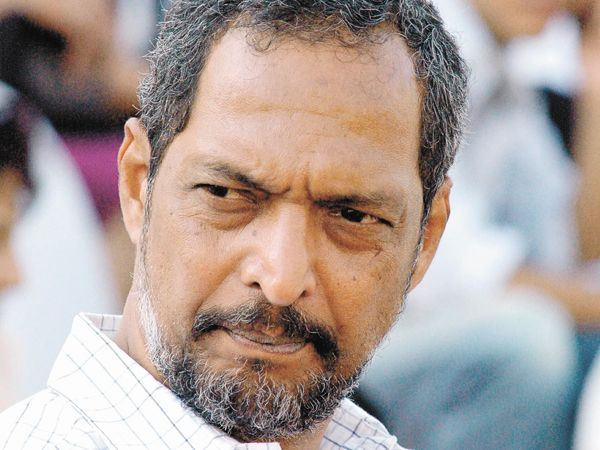PERSONAL INFORMATION
Real Name: Vishwanath Patekar
Nickname: Nana
Profession(s): Actor, Writer, Philanthropist, and Filmmaker
Date of Birth: 1 January 1951 (Monday)
Age (as of 2025): 74 Years
Birthplace: Murud-Janjira, Bombay State (now, Maharashtra), India
Zodiac sign: Capricorn
Nationality: Indian
Hometown: Mumbai, Maharashtra, India
Religion: Agnostic
Caste/Ethnicity: Marathi
Food Habit: Non-Vegetarian
Marriage Date: Year, 1978
Age: 74 Years
Check Out Other Celebrities Biography
- siddhant sharma calm biography
- vani tripathi biography
- tokhan sahu biography
- harsimrat kaur badal biography
- kumkum binwal biography
EDUCATION
School: Samarth Vidyalaya, Dadar West, Mumbai Bandra School of Arts (now L.S. Raheja School of Art) in Mumbai
College/Institute: Sir J.J Institute of Applied Arts, Mumbai
Educational Qualification: A Commercial Arts diploma from J J School of Arts
PHYSICAL STATISTICS
Height (approx.): 5′ 7″ (170 cm)
Eye Colour: Dark Brown
Hair Colour: Salt & Pepper
FAMILY & RELATIONSHIPS
Marital Status: Separated
Affairs/Girlfriends: Manisha Koirala (Actress) Ayesha Jhulka (Actress)
Wife/Spouse: Neelakanthi Patekar (a former Bank Officer)
Children: Sons – 2 • Durvasa (elder) (died at the age of two and a half years) • Malhar Patekar Daughter – None
Parents: Father – Gajanand Patekar (Businessman) Mother – Nirmala Patekar (Homemaker)
Siblings: Brothers – Ashok and Dilip Patekar Sister – Not known Note: He had 6 siblings out of which 5 passed away.
Song: “Itni shakti hame dena daata, man ka vishwas kamjor ho na” from the film Ankush (1986)
Wife: Neelakanthi Patekar
CAREER HIGHLIGHTS
Debut: Actor (Hindi Film): Gaman (1978) Actor (Marathi Film): Sinhasan (1979) Director (Hindi Film): Prahaar: The Final Attack (1991)
Awards/Honours: National Film Award 1990: Best Supporting Actor for Parinda 1995: Best Actor for Krantiveer 1997: Best Supporting Actor for Agni Sakshi Filmfare Award 1990: Best Supporting Actor for Parinda 1992: Best Villain for Angaar Other 2013: Padma Shri by the Government of India
MONEY FACTOR
Salary (approx.): Rs. 4 Crore/Film
OTHER INFORMATION
Address: 304 Sheetal, Apna Ghar Society, Samarth Nagar, Andheri, Mumbai
Hobbies: Cooking, Doing Philanthropy
Other Relatives: Manya Surve (slain gangster) (maternal cousin) [1] Divya Marathi
Food: Mutton Dishes, Malai Kabab, Prawns, Konkani Style Fish Curry, Goan Fish Curry
Restaurant: April Rain in Pune
Actress: Smita Patil, Madhuri Dixit
Singer(s): Kishore Kumar , Lata Mangeshkar
INTERESTING BACKGROUND INFORMATION
Nana Patekar’s journey through life is as compelling as the characters he portrays on screen. Born into a family with a complicated heritage, he was raised in Murud-Janjira by his mother after she sought to shield him from the notorious criminal background of his maternal relatives, particularly his cousin Many Surve, a gangster whose life inspired the Bollywood films “Agneepath” (1990) and “Shootout at Wadala” (2013). His childhood was marked by mischief, prompting his mother to send him to live with her sister in Mumbai when he was in the seventh grade. However, his spirited nature soon proved too much for his aunt, who returned him to Murud, fearing her own children were influenced by his antics.
Before embarking on his illustrious acting career, Nana engaged in several odd jobs to make ends meet. From painting zebra crossings to creating vibrant cinema posters, his early experiences shaped his creative spirit. Beginning his acting career at the tender age of five, he honed his craft on the Marathi stage with award-winning plays like “Hamidabaichi Kothi” and “Purush,” which laid the groundwork for his eventual transition to Marathi films and, ultimately, Bollywood. By age thirteen, he was painting cinema posters for a modest wage of ₹35 plus a meal, a testament to his early commitment to the arts. His initial foray into the film industry was supported by actress Smita Patil, who recognized his talent and introduced him to Ravi Chopra for a pivotal role.
Despite facing the harsh realities of discrimination in the early days of his career—largely due to his unconventional looks—Nana remained steadfast in his belief that true artistry transcends physical appearance. He famously stated, “I know I am not beautiful. But I wanted to make my performances beautiful,” emphasizing the importance of letting one’s work speak louder than any personal accolades. Ironically, after winning the Best Actor award for “Krantiveer” in 1995, he publicly acknowledged his prior cynicism towards award shows, admitting that he had once considered them a farce until he was honored himself.
A man of depth and conviction, Nana’s personal life has seen its share of tragedies, including the loss of his father at 28 and his son just two and a half years later due to a long-standing health issue. This profound grief shaped his outlook on life, prompting him to celebrate his son’s birthday in an orphanage as a tribute to his memory. Alongside his personal challenges, Nana has also remained committed to social causes, co-founding the Naam Foundation in 2015, which focuses on alleviating the distress of farmers in drought-prone regions of Maharashtra. His dedication to simplicity is remarkable; living in a modest 1 BHK apartment and resisting the lure of a lavish lifestyle, he often expresses gratitude for his humble beginnings and the values instilled in him by his mother.
With a multifaceted career that includes acting, singing, and even producing, Nana Patekar stands as a unique figure in the Indian film industry. He is known for his distinctive dialogue delivery and infectious laughter, which have endeared him to audiences. Beyond his professional achievements, he has a passion for cooking and proudly claims the ability to prepare meals for over 150 people, showcasing a culinary skill inherited from his mother. Interestingly, his charm extends to his playful, albeit unrequited, affection for Bollywood icon Madhuri Dixit, with whom he shared his feelings during an interview, even reciting a heartfelt poem from the film “Wajood” (1998). As he continues to evolve as an artist, Nana Patekar remains a testament to resilience, creativity, and the enduring power of storytelling in cinema.
—
Note: All biographical information compiled from publicly available sources.
